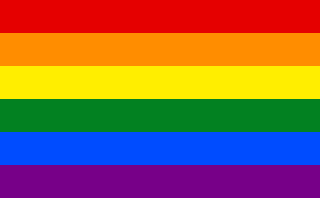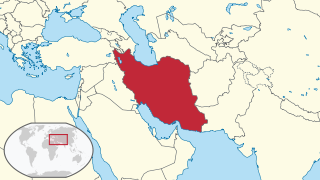Related Research Articles

LGBT is an initialism that stands for "lesbian, gay, bisexual, and transgender." In use since the 1990s, the initialism, as well as some of its common variants, functions as an umbrella term for certain sexualities and gender identities.
The following outline offers an overview and guide to transgender topics.

Transgender rights in Iran are limited, with a narrow degree of official recognition of transgender identities by the government, but with trans individuals facing very high levels of discrimination, from the law, the state, and from the wider society.

LGBT people in Azerbaijan face legal and social challenges not experienced by non-LGBT residents. Same-sex sexual activity has been legal in Azerbaijan since 1 September 2000. Nonetheless, discrimination on the basis of sexual orientation and gender identity are not banned in the country and same-sex marriage is not recognized.

Lesbian, gay, bisexual, and transgender (LGBT) people in Malaysia face significant challenges, prejudices and threats not experienced by non-LGBT residents. There are no LGBT rights in Malaysia, with sodomy a crime in the country, with laws strictly enforced. Muslims may also be additionally convicted in a court under sharia law with the possibility of a judicially sanctioned capital punishment for homosexuality. Extrajudicial murders of LGBT people have also occurred in the country. There are no Malaysian laws that protects the LGBT community against discrimination and hate crimes.

The term travesti is used in Latin America—to designate people who were assigned male at birth, but develop a gender identity according to different expressions of femininity. Other terms have been invented and are used in South America in an attempt to further distinguish it from cross-dressing, drag, or pathologizing connotations. In Spain, the term was used in a similar way during the Franco era, but it was replaced with the advent of the medical model of transsexuality in the late 1980s and early 1990s, in order to rule out negative stereotypes. The arrival of these concepts occurred later in Latin America than in Europe, so the concept of travesti lasted over time with various connotations.
LGBT movements in the United States comprise an interwoven history of lesbian, gay, bisexual, transgender and allied movements in the United States of America, beginning in the early 20th century and influential in achieving social progress for lesbian, gay, bisexual, transgender and transsexual people.
This article focuses on Japanese definitions of gender and sexuality, Japanese reactions to queer life, the clash between traditional and contemporary ideas, and the cultural restraints of being queer in Japan. The Western term “queer,” an umbrella term for gay, lesbian, bisexual, and transgender represents a change in thought pertaining to gender and sexuality in contemporary Japan.

A transgender person is someone whose gender identity or gender expression does not correspond with the sex they were assigned at birth. Many experience gender dysphoria, which they may seek to alleviate through transitioning, often adopting a different name and set of pronouns in the process. They may pursue gender affirming care such as hormone replacement therapy and various gender-affirming surgeries. Not all transgender people desire these treatments and others may be unable to access them for financial or medical reasons. Those who do desire to medically transition to another sex may identify as transsexual.

Lesbian, gay, bisexual, transgender and queer (LGBTQ) people face difficulties in prison such as increased vulnerability to sexual assault, other kinds of violence, and trouble accessing necessary medical care. While much of the available data on LGBTQ inmates comes from the United States, Amnesty International maintains records of known incidents internationally in which LGBTQ prisoners and those perceived to be lesbian, gay, bisexual or transgender have suffered torture, ill-treatment and violence at the hands of fellow inmates as well as prison officials.

A trans woman or a transgender woman is a woman who was assigned male at birth. Trans women have a female gender identity and may experience gender dysphoria, distress brought upon by the discrepancy between their gender identity and sex assigned at birth. Gender dysphoria may be treated with gender-affirming care.

This article provides an overview of the development of LGBTQIA+ representation, as well as rights of the community, in modern day Turkey. In addition, it addresses their contribution and struggles as well as the coalitions they have built from the Abolition of the Caliphate times until the 21st century.
Feminist views on transgender topics vary widely. Third-wave feminists and fourth-wave feminists tend to view the struggle for trans rights as an integral part of intersectional feminism. Former president of the American National Organization for Women (NOW) Terry O'Neill has stated that the struggle against transphobia is a feminist issue, with NOW affirming that "trans women are women, trans girls are girls." Several studies have found that people who identify as feminists tend to be more accepting of trans people than those who do not.

Shadi Amin is an Iranian writer and activist. She was forced to leave Iran in early 1980s because of her political activities. Amin is currently living in exile in Germany.

Lesbian, gay, bisexual, and transgender (LGBT) people generally have limited or highly restrictive rights in most parts of the Middle East, and are open to hostility in others. Sex between men is illegal in 9 of the 18 countries that make up the region. It is punishable by death in five of these 18 countries. The rights and freedoms of LGBT citizens are strongly influenced by the prevailing cultural traditions and religious mores of people living in the region – particularly Islam.

The following outline offers an overview and guide to LGBT topics.
Gender and sexual diversity (GSD), or simply sexual diversity, refers to all the diversities of sex characteristics, sexual orientations and gender identities, without the need to specify each of the identities, behaviors, or characteristics that form this plurality.
Rauda Morcos is a Palestinian poet and LGBTIQ activist living in Haifa in Israel. In 2003, she was outed as a lesbian by a national newspaper, leading to dismissal from her job, physical assaults and attacks on her car. She then set up Aswat, the first Palestinian group dedicated to supporting lesbians.

The LGBT Centre Mongolia was founded in 2007 and is based in Ulaanbaatar. After a legal struggle, it was officially recognised in 2009. It then submitted reports to the United Nations which encouraged the Mongolian government to change its criminal code. The centre supports LGBT rights in Mongolia and has organised an annual Pride march since 2013. It was awarded the Felipa de Souza Award in 2011.
Angela Lynn Douglas was an American transgender activist and singer. She was a transgender woman who performed as a rock musician and was a prominent figure in transgender activism during the 1970s. She founded the Transsexual Action Organization (TAO), the first international trans organization. She wrote articles about the state of trans politics at the time for the Berkeley Barb, The Advocate, the Bay Area Reporter, and Everywoman, in addition to TAO's Mirage magazine and Moonshadow Bulletin. She expressed racist attitudes at various points in her life, and at one point became active with the Nazi party.
References
- 1 2 3 Tegün, Bülent (2 March 2009). "Transseksüel aktivist Demet Demir ile röportaj". Turquie Européenne (in Turkish). Retrieved 2019-06-19.
- 1 2 3 4 5 6 7 8 9 10 11 Demishevich, Michelle (2015-06-19). "LGBTİ derneklerinde fon icat oldu, aktivizm bozuldu; LGBTİ mücadelesi şirketleşti!". t24.com (in Turkish). Retrieved 2019-06-23.
- 1 2 3 4 5 6 7 8 9 10 11 12 "News » Interview with Demet Demir, A Turkish Transgender Activist". Kaos.gl. 1 December 2004. Archived from the original on 11 October 2008. Retrieved 2019-06-26.
- 1 2 3 4 5 6 7 8 9 "DEMET DEMIR'". www.qrd.org. Retrieved 2019-06-25.
- ↑ "Felipe de Souze ve Demet". Queer Resources Directory. Retrieved 2019-06-21.
- 1 2 "Hortum'un, İngiltere'de tiyatrosu bile yapılmış". Hurriyet (in Turkish). 4 June 2000. Retrieved 2019-06-21.
- 1 2 3 "Turkey: Transsexual Activist Sues Beyoglu Police Bureau". Global LGBT Human Rights Organization | OutRight. 1997-06-01. Retrieved 2019-06-19.
- ↑ Lind, Amy (2010-01-04). Development, Sexual Rights and Global Governance. Routledge. p. 253. ISBN 9781135244590.
- ↑ "Awards 2019". OutRight. 2019-01-15. Retrieved 2019-06-21.
- ↑ "Turkish Transactivist Assaulted, Re-Arrested After Receiving US Award". In Your Face (5): 3. Spring 1997 – via Digital Transgender Archive.
- ↑ "Human Rights Watch World Report 1998". Human Rights Watch. Retrieved 2019-06-23.
- ↑ We Need a Law for Liberation - Gender, Sexuality, and Human Rights in a Changing Turkey. Human Rights Watch. 2008. p. 8. ISBN 978-1564323163.
- ↑ "ÖDP'den aday portreleri". Hurriyet (in Turkish). 2 November 1999. Retrieved 2019-06-21.
- ↑ Gürel, Perin E. (2017-05-30). The Limits of Westernization: A Cultural History of America in Turkey. Columbia University Press. ISBN 9780231543965.
- ↑ We Need a Law for Liberation - Gender, Sexuality, and Human Rights in a Changing Turkey. Human Rights Watch. 2008. p. 75. ISBN 978-1564323163.
- ↑ "Kutluğ Ataman.Artworks.Women Who Wear Wigs.Description". www.kutlugataman.com. Retrieved 2019-07-02.
- ↑ Elkins, James; Newman, Michael (2007-11-13). The State of Art Criticism. Routledge. p. 81. ISBN 9781135867591.